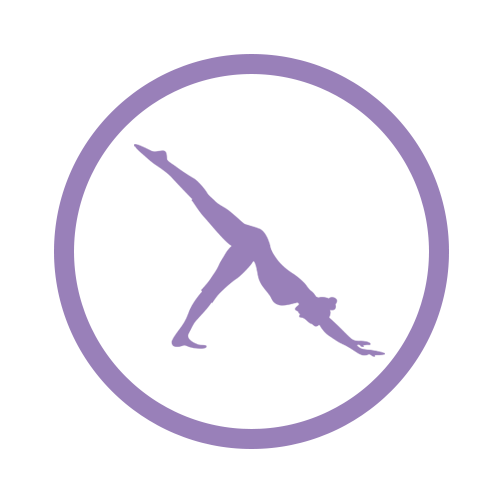Lower back pain can be a debilitating condition that affects millions of people worldwide. Whether it’s caused by a sedentary lifestyle, poor posture, or an injury, finding relief is crucial for maintaining a healthy and active life. It’s also a common complaint among individuals who perform planks and experience back pain afterward. In this blog, we will explore some effective stretches that you can incorporate into your daily routine to find relief and promote a strong, pain-free lower back.
Some Effective Lower Back Stretches:
1. Child’s Pose:
Child’s pose is a yoga pose that is often used as a resting or relaxation posture. In this pose, the practitioner sits back on their heels, lowering their torso towards the thighs and resting their forehead on the ground.
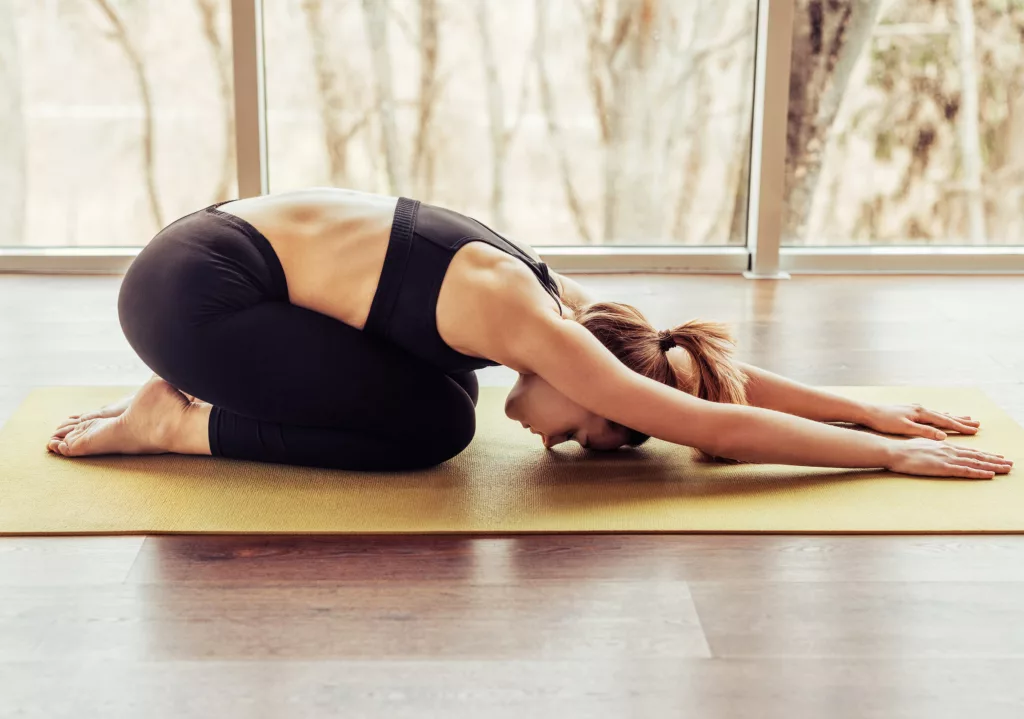
Target: Back, Hips, and Thighs
Steps:
1. Start by kneeling on the floor with your knees hip-width apart.
2. Slowly lower your hips towards your heels while stretching your arms forward.
3. Allow your forehead to rest and gently stretch releasing tension in the lower back.
2. Cat-Cow Stretch:
Cat cow pose is beneficial for warming up the spine, promoting flexibility, and improving the mobility of the spine.
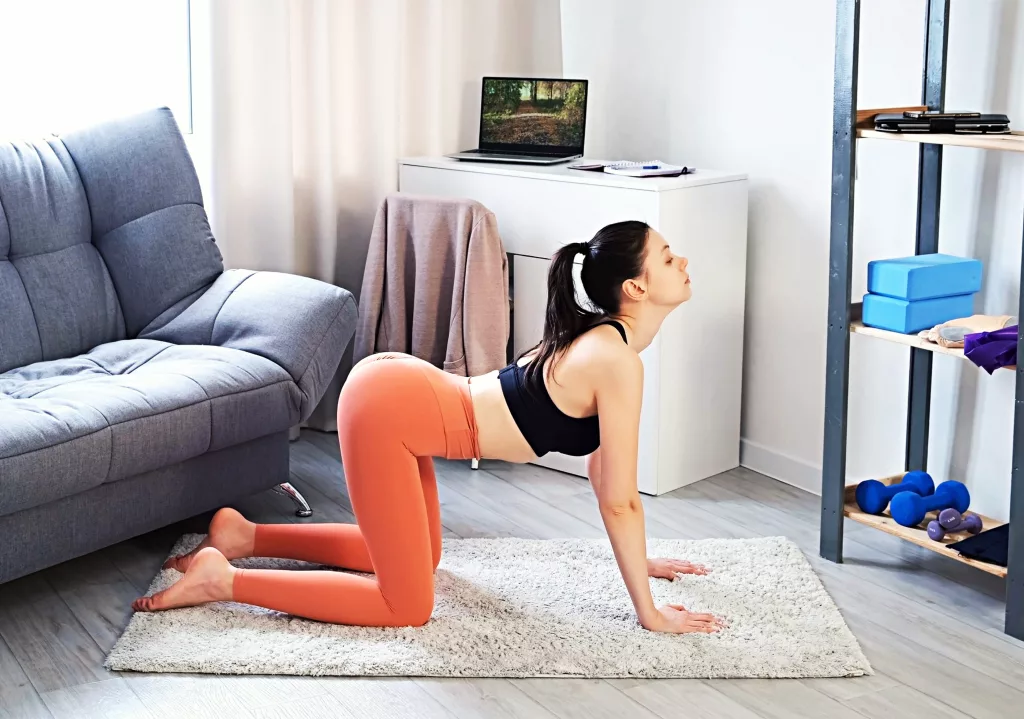
Target: Spine, Abdomen, and Core
Steps:
1. Position yourself on all fours with your hands directly beneath your shoulders and your knees under your hips.
2. Inhale deeply and arch your back, allowing your belly to drop towards the floor while lifting your head and tailbone.
3. Exhale and round your back, pulling your belly button towards your spine.
3. Sphinx Pose:
Sphinx pose involves lying on your stomach and lifting your upper body off the ground using your arms.
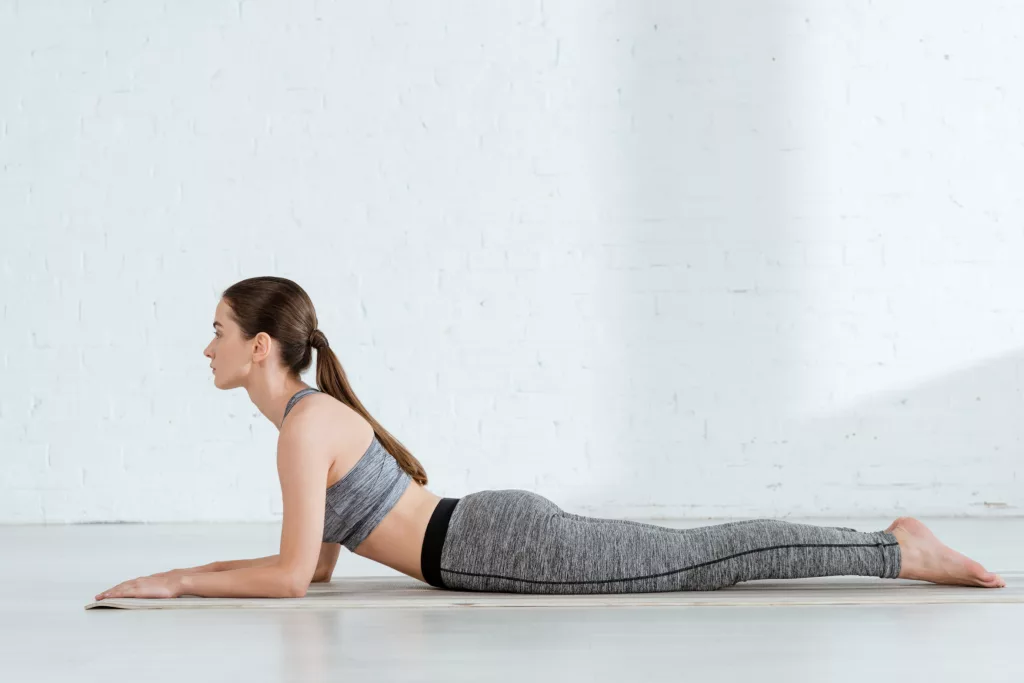
Target: Back, Chest and Shoulders
Steps:
1. Lie on your stomach with your legs extended behind you.
2. Place your forearms on the ground, elbows directly beneath your shoulders.
3. Press your forearms into the floor and lift your upper body, arching your back gently.
4. Knee-to-Chest Stretch:
This stretch releases tension in the lower back and stretches the glutes and hips.
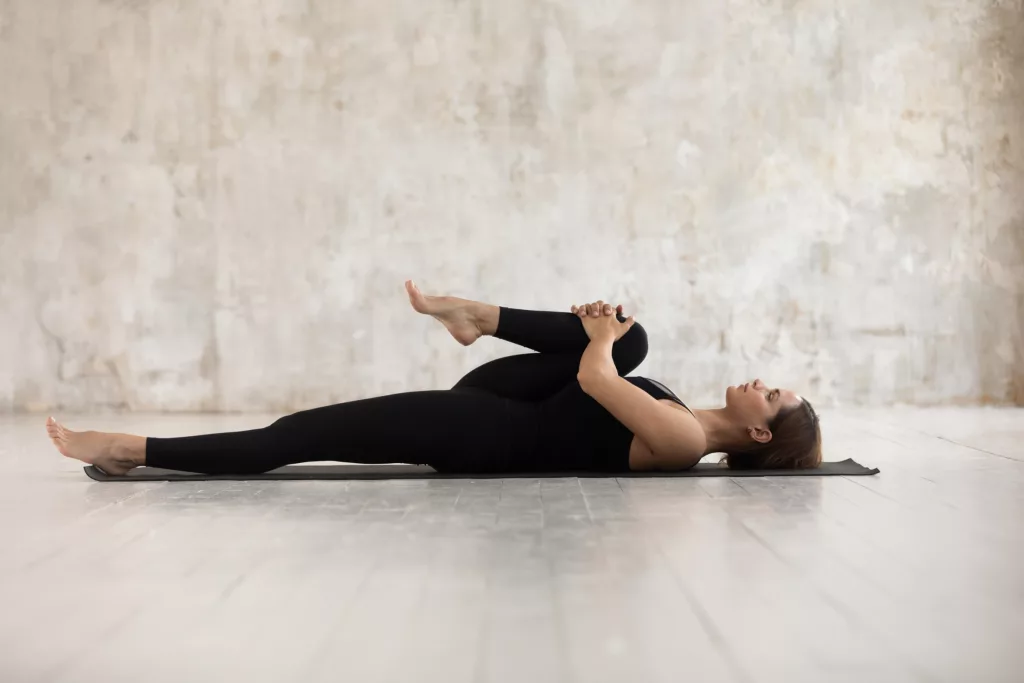
Target: Glute, Back and Hips
Steps:
1. Lie flat on your back with your legs extended.
2. Slowly bring one knee towards your chest, gently pulling it closer with both hands.
3. Hold the stretch for 15-30 seconds and then switch sides.
5. Standing Forward Bend:
Standing forward bends lengthens the muscles in the lower back and hamstrings, relieving pain and discomfort.
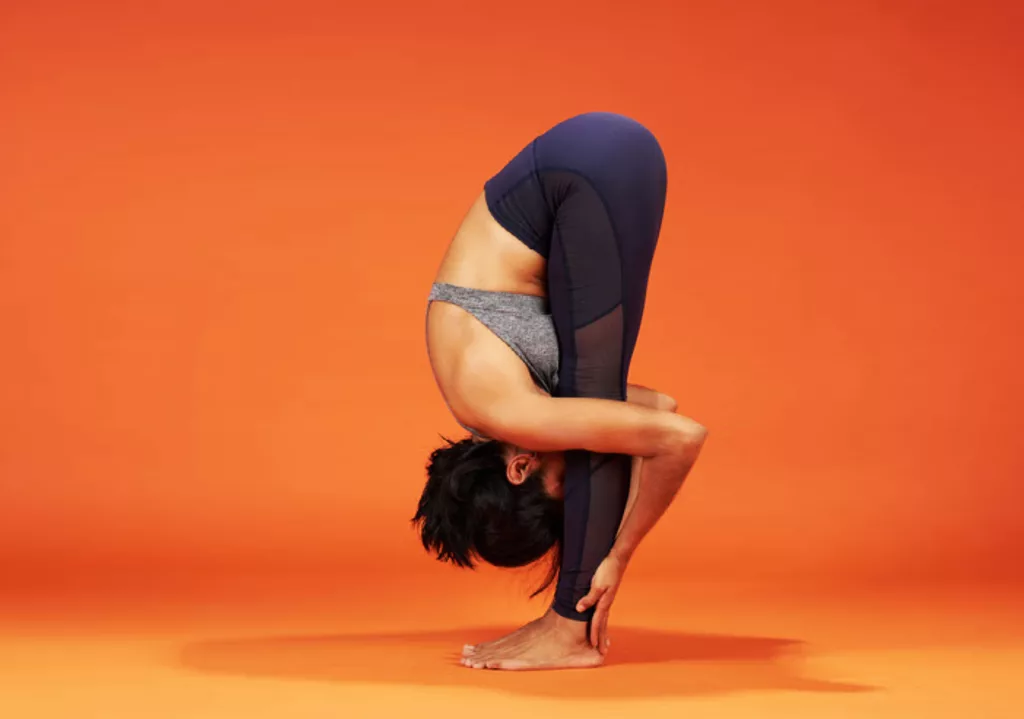
Target: Hamstrings, Lower back and Spine
Steps:
1. Stand with your feet hip-width apart.
2. Slowly bend forward from your hips, allowing your upper body to hang freely.
3. Let your arms dangle or reach towards the ground.
Also Read: Lower Back Pain Relief: Workout Plan
Remember:
- Make sure to add these stretches to your warm-up and cool-down workout routine.
- Hold each stretch for 30 seconds to 1 minute, focusing on deep breathing and relaxation.
- Do not force the stretches or push beyond your comfort zone.
- Perform these stretches 2-3 times a week or as needed for pain relief and flexibility improvement.
What causes lower back pain?
Lower back pain can have multiple causes, including muscle imbalances, weak core muscles, poor posture, excessive sitting, and physical strain from activities like planking or exercising. Understanding these causes can help you address the root of the problem:
1. Poor Posture:
Prolonged sitting or standing with poor posture puts excessive stress on the lower back, leading to muscle imbalances and pain. Slouching, hunching over a desk, or carrying heavy bags incorrectly can contribute to lower back discomfort.

2. Sedentary Lifestyle:
Leading a sedentary lifestyle with minimal physical activity weakens the muscles that support the spine, making them more susceptible to strain and injury. Lack of exercise also leads to reduced flexibility and poor posture, further contributing to lower back pain.
3. Muscle Strain:
Overstretching or tearing of the muscles and ligaments in the lower back can result in pain. This can occur due to improper lifting techniques, sudden movements, or engaging in activities that strain the back muscles.
4. Poor form during Exercise:
Many people question why they feel lower back pain after performing a plank. The answer is poor form during your exercise.
Planks are an excellent exercise for strengthening the core, but they can sometimes lead to lower back pain if not performed correctly. Poor form, such as sagging or arching the lower back, leading to discomfort. It’s important to maintain proper form, engage the core muscles to avoid lower back pain during exercise.
5. Psychological Factors:
Psychological factors, including stress, anxiety, and depression, can manifest as physical symptoms, including lower back pain. Emotional stress and tension often result in muscle tightness and increased sensitivity to pain.
Incorporate These Stretches into Your Routine with the O’Coach App
To address lower back pain effectively and prevent future discomfort, it’s essential to incorporate targeted stretches into your fitness routine. One convenient and user-friendly option is the O’Coach Custom Workout App, which allows you to create a personalized workout plan tailored to your specific needs. Here’s how the app can help you achieve your fitness goals and integrate the recommended stretches for lower back pain relief:
1. Create Your Custom Workout: With the O’Coach app, you can design a workout program that suits your fitness level, preferences, and specific areas of focus.
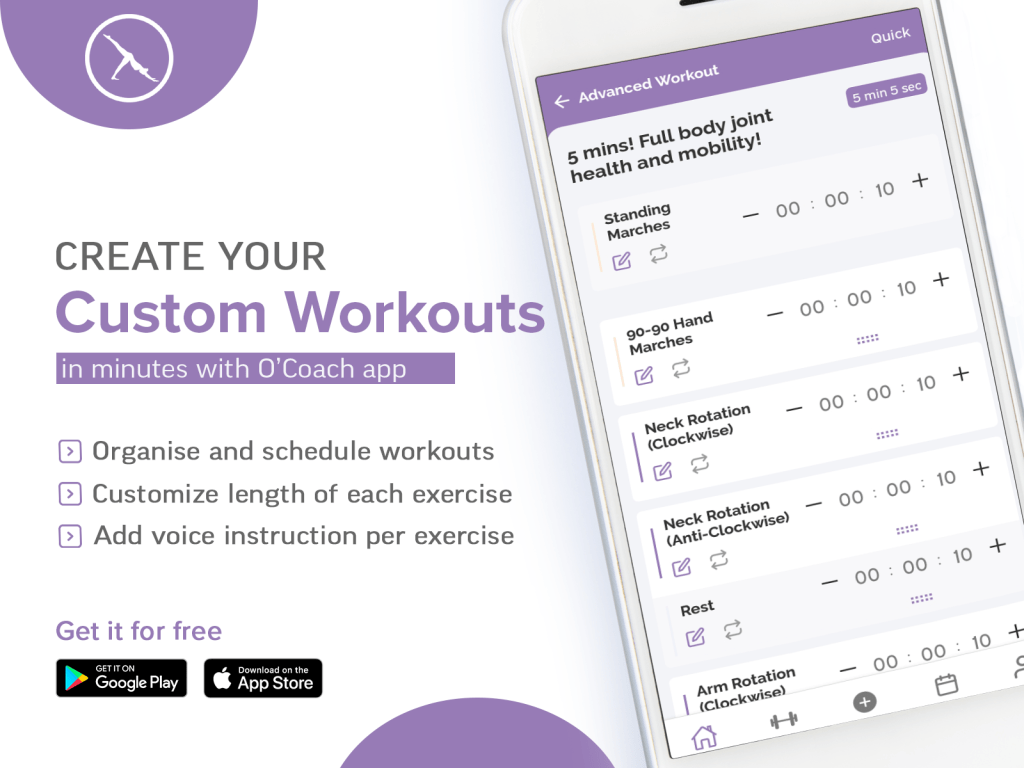
2. Schedule Workouts for Busy Days: O’Coach understands that our lives can get hectic, making it challenging to find time for exercise. However, the app allows you to schedule your workouts conveniently.
3. Track Your Progress: The O’Coach app enables you to track your progress and monitor your performance over time. By recording your workout results and tracking improvements, you can stay motivated and see how your consistency and effort are paying off. This feature is particularly helpful when it comes to managing lower back pain and monitoring your flexibility and strength gains.
4. Access to Demonstrations and Voice Guidance: The O’Coach app provides video demonstrations and voice guidance for each exercise, ensuring that you perform them with proper form and technique. The unique Text to Speech timer engine works like your own personal trainer when you are doing a workout, keeping a track of time for you and continually motivating you. It is designed to help you achieve the maximum efficiency out of any workout session.
Download the O’Coach Custom Workout App today and take control of your fitness journey, making significant strides toward a healthier, pain-free lower back.
